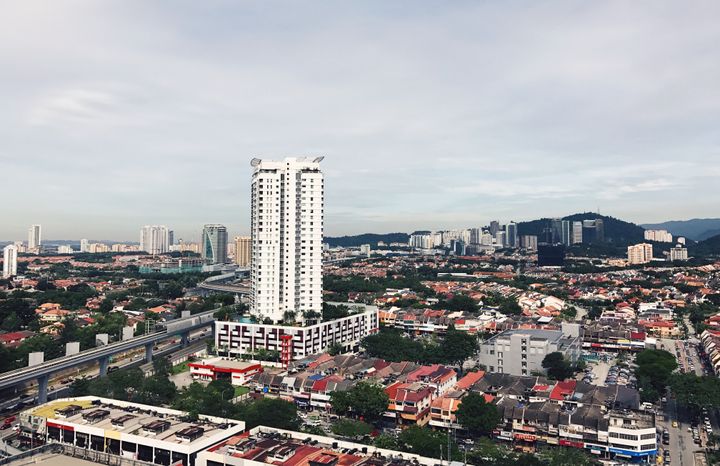Insights from the Haryana Real Estate Tribunal: A Guide to Common Area Entitlement
Landmark Ruling Alert 🚨 The Haryana Real Estate Tribunal settles the proportionate percentage entitlement dispute in the Suncity Parikarma residential complex. Homeowners, know your rights! #RealEstate #Haryana #TribunalCaseGuide

In the bustling real estate sector of Haryana, a significant legal battle unfolded before the Haryana Real Estate Appellate Tribunal that sent ripples throughout the industry. This comprehensive guide aims to shed light on the intricacies of the case and its implications for all stakeholders involved.
The case, Appeal No. 425 of 2022, dated 13.07.2023, witnessed the involvement of several parties, including appellants and respondents. The issues raised in the case centered around proportionate percentage entitlement in common areas, making it a crucial matter with far-reaching consequences.
Background of the Case
At the heart of the case lies the Suncity Parikarma residential complex situated in Sector 20, Panchkula. The project's development and management were undertaken jointly by M/s Suncity Projects Pvt. Ltd. and M/s Santur Developers Pvt. Ltd., two prominent players in the real estate market.
The Directorate of Town and Country Planning Haryana played a significant role in the case, being responsible for overseeing and regulating real estate developments in the state. As the residential complex was inhabited by numerous homeowners, the Parikrama Residents Welfare Association was formed to represent the interests of the residents.
Parties Involved in the Appeal
The appeal witnessed a diverse group of appellants, each with their unique background and stakes in the case. Among them were:
- Amit Jindal: Son of Mr. Satpal Jindal, a resident of Flat No. 803, Tower No. 7B, Suncity Parikarma.
- Akhil Goel: Son of Mr. Anil Kumar Goel, a resident of Flat No. 601, Tower No. 7A, Suncity Parikarma.
- Sunny Jindal: Son of Mr. Raj Kumar Jindal, residing in Flat No. 701, Tower No. 7B, Suncity Parikarma.
- Anju Mittal: Wife of Mr. Shailendra Nath Mittal, residing in Flat No. 1302, Tower No. 7B, Suncity Parikarma.
- Vipin Sharma: Son of Mr. G.B. Sharma, residing in Flat No. 401, Tower No. 8B, Suncity Parikarma.
- Joginder Paul Arora: Son of Mr. Sita Ram, residing in Flat No. 703, Tower No. 9B, Suncity Parikarma.
- Rajeev Khullar: Son of Mr. Gian Chand Khullar, residing in Flat No. 1701, Tower No. 10A, Suncity Parikarma.
- Jagdish Lal Vohra: Son of Mr. Jiwan Dass Vohra, residing in Flat No. 402, Tower No. 10B, Suncity Parikarma.
- Gaurav Bharti: Son of Mr. Techchand Bharti, residing in Flat No. 703, Tower No. 10B, Suncity Parikarma.
- Sudesh Gupta: Wife of Mr. Lalit Kumar Gupta, residing in Flat No. 1002, Tower No. 10B, Suncity Parikarma.
- Geetika: Wife of Mr. Bodhraj Thakur, residing in Flat No. 1001, Tower No. 11A, Suncity Parikarma.
- Jaswinder Kaur Chugh: Wife of Mr. Bhupinder Singh Chugh, residing in Flat No. 1303, Tower No. 10B, Suncity Parikarma.
- Heeralal Gupta: Son of Mr. Kuldeep Parkash, residing in Flat No. 901, Tower No. 11B, Suncity Parikarma.
- Narayan Iyer: Son of Mr. Subramaniam, residing in Flat No. 1302, Tower No. 11A, Suncity Parikarma.
- Abhishek Garg: Son of Mr. Manish, residing in Flat No. 1702, Tower No. 11A, Suncity Parikarma.
On the other side, the respondents included the real estate developers, M/s Suncity Projects Pvt. Ltd. and M/s Santur Developers Pvt. Ltd., as well as the Directorate of Town and Country Planning Haryana.
The Complaint and the Authority's Order
The complaint filed by the appellants before the Haryana Real Estate Regulatory Authority raised significant concerns regarding proportionate percentage entitlement in common areas within the residential complex. The dispute centered around the rights and privileges granted to each homeowner in these shared spaces.
In a detailed order, the Authority deliberated on the specific issues raised in the complaint and concluded that the relief sought by the appellants could only be granted to a duly constituted Residents Welfare Association (RWA) through its executive body. As the RWA had been formed after the complaint was filed, the Authority deemed the complaint premature and dismissed it. The Authority anticipated that the maintenance of the society, along with other rights and the IFMS amount, would be handed over to the RWA after its constitution.
Legal Aspects of the Case
The Haryana Real Estate Appellate Tribunal delved into the legal aspects of the case, with a particular focus on 'The Haryana Apartment Ownership Act, 1983.' This pivotal legislation outlined the rights and obligations of apartment owners and the management of common areas within residential complexes.
The Tribunal analyzed the Rules made under the 1983 Act and examined their impact on the issue of proportionate percentage entitlement. The central contention between the appellants and the respondent-promoter revolved around the deed of declaration submitted by the latter before the Authority.
Haryana Real Estate Appellate Tribunal Proceedings
The Haryana Real Estate Appellate Tribunal, comprising Justice Rajan Gupta (Chairman), Shri Inderjeet Mehta (Member Judicial), and Shri Anil Kumar Gupta (Member Technical), played a crucial role in the proceedings. During the appeal, both the appellants and respondents presented their arguments, which were subject to rigorous scrutiny.
The Tribunal ultimately upheld the Authority's order, citing that the proportionate percentage entitlement issue was a matter that could be raised before the newly formed RWA. The Tribunal emphasized the significance of the RWA in representing the collective interests of all allottees.
Implications and Outcomes of the Case
The Tribunal's decision holds immense implications for the appellants and other stakeholders. It sets a precedent for future real estate disputes in Haryana, emphasizing the importance of a properly constituted RWA in addressing such matters. The liberty granted to the appellants for further redressal ensures that they can seek resolution through the appropriate channels.
Key Takeaways and Lessons Learned
The case offers valuable takeaways for various parties involved in the real estate sector. Real estate developers can gain insights into adhering to legal provisions and ensuring transparent dealings with homeowners. Buyers can understand the significance of active participation in forming RWAs for safeguarding their rights and interests. Regulatory bodies can also learn from the case to ensure a fair and streamlined dispute resolution process.
Conclusion
The Haryana Real Estate Appellate Tribunal case involving the Suncity Parikarma residential complex serves as a landmark event in the state's real estate landscape. By unraveling the complexities of the case and its legal implications, this guide offers a comprehensive understanding of the matter. The Tribunal's decision highlights the pivotal role of RWAs in protecting the rights of homeowners and fostering a harmonious real estate ecosystem.
Note: The information provided in this article about Haryana Real Estate Regulatory Authority (HRERA) is for informational purposes only. It is not intended as legal or professional advice and readers should consult qualified professionals for advice specific to their circumstances. The information provided in this article is based on the Appeal No. 425 of 2022 before the Haryana Real Estate Regulatory Authority
We hope you found our blog insightful and engaging! We appreciate your time and interest. If you enjoyed reading it, don't forget to subscribe to our newsletter to receive regular updates on our latest content. Visit our website www.reunionhq.in to know more.
| Assam RERA | Haryana RERA | Karnataka RERA |
|---|---|---|
| Maharashtra RERA | Rajasthan RERA | Chhattisgarh RERA |
| Gujarat RERA | Madhya Pradesh RERA | Punjab RERA |



